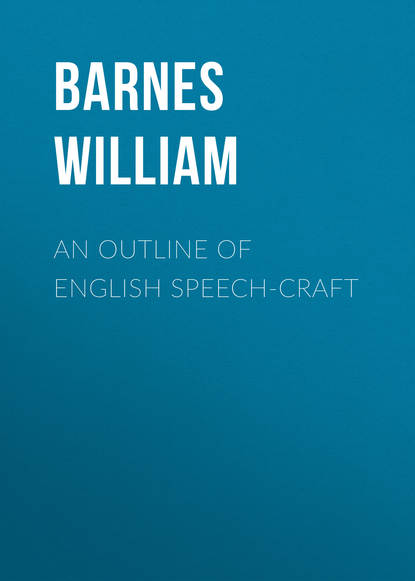По всем вопросам обращайтесь на: info@litportal.ru
(©) 2003-2024.
✖
An Outline of English Speech-craft
Настройки чтения
Размер шрифта
Высота строк
Поля
‘Can you smell now? you had, the other day, lost your smelling?’ ‘Yes, I smell very nicely.’ Not I smell as being myself very nice. A rose cannot smell any other thing, and so cannot smell it nicely.
‘Mary sings very charmingly,’ but ‘Mary looks very charming.’
‘John looks pale,’ but ‘John looks very narrowly into that gold-work.’
‘I can taste well,’ ‘That peach tastes good.’
To have seen a man at a bygone time would mean that the seeing was before that bygone time; but we sometimes hear a man say, ‘I should (yesterday) have been very glad to have seen you (if you had called yesterday).’ That is, by wording, ‘I should have been very glad (yesterday) to have seen you (at a time before yesterday),’ not to see you yesterday; and yet that is what the speaker means. ‘I should have been very glad (yesterday) to see you (yesterday),’ or ‘I should be very glad to-day to have seen you yesterday.’
3. Odd word-shapes are not in the main choice-worthy.
Our time-word go is of unwontsome conjugation, as its foretime shape went is not shapen from go, but is a shape of another word, wend.
So the forlessening name, leveret for a hareling, and cygnet for a swanling, are unwontsome, as being words of another speech.
4. There is a greater or less freedom of word-shifting (Gr. anastrophe, up-shifting or back-shifting), as up in ‘Fasten it up well,’ ‘fasten it well up’; or back in ‘He brought back the saw,’ or ‘he brought the saw back’; ‘There is none to dispute my right,’ or ‘my right there is none to dispute.’
Why should not English, like other tongues, more freely form words with headings of case-words, as downfalls, incomings, offcuttings, outgoings, upflarings, instead of the awkward falls-down, comings-in, cuttings-off, goings-out, flare-ups; or offcast (for cast-off) clothes; or a downbroken (for a broken-down) schoolmaster; outlock or outlocking (for a lock-out); the uptaking beam (for the taking-up beam) of an engine?
Oddly-shapen or Oddly-taken Words.
Mongrel (hybrid) words, or words partly from one tongue and partly from another.
Twy-speechwords are a sore blemish to our English, as they seem to show a scantiness of words which would be a shame to our minds; as,
Sub-warder for under-warder.
Pseudo-sailor for sham-sailor.
Ex-king for rodless or crownless king.
Prepaid for forepaid.
Bi-monthly for fortnightly or every fortnight.
Wordiness (Verbosity).
As ‘The train ran with extraordinary velocity,’ for ‘the train ran very fast.’
‘Alfred did the business with perfect fidelity;’ for ‘Alfred did the business faithfully.’
Thence much of the wordiness of our written, if not spoken, composition.
The ‘New York Times’ thus explains how it was that the flames got to the roof in the burning of the Fifth Avenue Hotel: – ‘Fire always is aspirant, the sole exception being where incandescent masses fall down, and so act as a medium of ignition.’
The hard breathing (aspirate) is often wrongly dropped or misput by less good speakers; but, while the upper ranks laugh at them for their mistakes, they themselves, like our brethren of Friesland and Holstein, often drop it from words to which it of right belongs, and mainly from the hard-breathed W or the Saxon HW (our WH).
Shall we soon hear ‘Wet the ’ook with a wetstone’ for ‘Whet the hook with a whetstone’?
Some Englishmen would say, ‘The ’ammer is on the hanvil’; and some have been known to say, ‘’enry ’it ’orace with the ’ollow of ’is ’and,’ for ‘Henry hit Horace with the hollow of his hand.’
English mark-timewords (participles) are of two kinds – one of an ongoing time-taking, as ‘the rising sun’; and another of the ended time-taking, as ‘the risen sun’; and they are of a few sundry shapes, some ending with -en, -n, as broken, and others ending with -ed, -d; and some without an ending, as cut.
1. In -en, those which are of one breath-sound, and moulded so that the bygone time-shape takes the sound (7) o[2 - See Table of Sounds, p. 1 (#pgepubid00003).]: —
2. Some one-sounded and moulded time-words, of the sound (8) in the shape for bygone time, take -en, -n; as,
Unmoulded time-words take -ed, but a few of them take -ed or -en; as,
These following, as is shown by the Saxon, ought to take -ed rather than -en: —
Hew.
Rive.
Show.
Shape, shave, and swell were in Saxon moulded, and thence took -en.
There is a set of time-words which were weak, but are now endingless in their mark-word shape. They ended with a roof-penning -t or -d, and the roof-penning of the ending -ed ran at last into the roof-penning of the stems in the way shown on p. 22 (#pgepubid00020), and their mark-word shapes are the same as those for bygone time.
Cast.
Cost.
Cut.
Hit.
Let.
Put.
Rid.
Set.
Shoot.
Shut.
Split.
Spread.
Shed.
Shortened Shapes (p. 23 (#pgepubid00027)).





